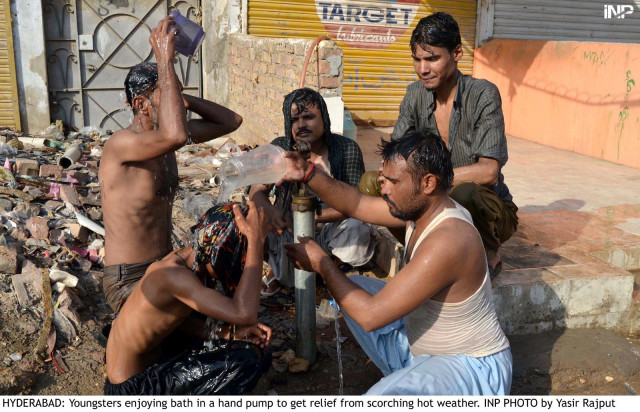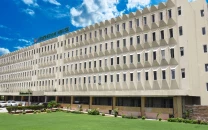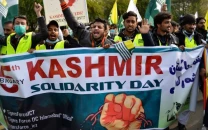Sweltering summer solstice: Sun rains down death on Karachi
Over 120 confirmed dead due to heat-related complications in the metropolis over the past 2 days

Over 120 confirmed dead due to heat-related complications in the metropolis over the past 2 days. PHOTO: INP
A severe heat wave has killed more than 120 people in Karachi over the last 48 hours and left dozens of others hospitalised for heat exhaustion, crippling routine life and work in the country’s financial hub.
Blistering triple-digit temperatures in the meantime continued to play havoc across Pakistan, which is experiencing what many experts are arguably calling one of its hottest summers. The temperature in the port city was recorded at 107°F (42°C) on Sunday, the longest day of the year, confining most people to their homes.
Read: Hottest day so far: Heat wave claims five lives as Pakistan swelters
The number of patients with complaints of dehydration and low blood pressure was reported high at public and private hospitals.
Dr Seemin Jamali, the joint executive director of the Jinnah Postgraduate Medical Centre (JPMC), counted the number of heat-related fatalities brought to her hospital alone at 85. “Since Saturday night, more than 30 people have been brought dead to the hospital due to heatstroke. Fifty-five others died during treatment,” she added.

At least 27 fatalities were reported at the Abbasi Shaheed Hospital (ASH). Of these, 21 were brought dead at the hospital since Sunday morning, while six others died during treatment. The Civil Hospital Karachi (CHK) also reported six deaths.
Dr Jamali said the heat wave has altered the overall situation. “The number of patients has gone high.” She said more than 1,500 patients were brought to the JPMC in the past 24 hours. “The number of the old and already sick patients is very high.”
Many hospitals – including the CHK, the ASH and the JPMC, as well as private hospitals – dealt with scores of patients with complaints of dehydration, low blood pressure, gastro-intestinal issues and fever.
“Most of the people were brought dead at different hospitals of the city,” said Dr Salma Kausar Ali, senior medical and health services director of the Karachi Metropolitan Corporation. “These deaths are most probably due to the rising temperature.” She said the number of patients with sunstroke and dehydration has gone up in the past two days.
Read: Heat wave: Electricity demand hits record high on first day of Ramazan
According to unverified reports, two labourers working in Keamari had died a day earlier due to heatstroke, while nine others, including two other labourers, died in Lyari since Saturday.
Heatstroke also claimed two lives in Dadu district’s Johi and Kakkar areas on Saturday and Sunday, respectively.
Rolling power cuts have played the fiendish role of accessory, adding to the miseries of the people. In rural areas, the duration of electricity load-shedding has reached a total of 18 hours while a number of urban areas endured 14 hours of load-shedding.
“The reason for these deaths is nothing but heatstroke,” said Dr Abdul Ghafoor Shoro, a family physician.
He said a large number of labourers work without taking any safety or precautionary measures. “And most of them are fasting.”
He said 80 per cent of the patients at his hospital complained of low blood pressure and dehydration. “At least the diabetics should consult their doctors before fasting.”
Dr Shoro lamented that Karachi lacked the basic necessities of life: “The city is faced with multiple problems, including load-shedding and water shortage. Electricity and water are the basic necessities during these extremely hot days.”
150 bodies brought to morgue
More than 150 bodies have been brought to the Edhi morgue in Sohrab Goth since Saturday. “The number has gone up in two days,” said Anwar-e-Kazmi, a spokesperson for the Edhi Foundation, adding that families couldn’t keep the bodies for a longer period because of the heat.
Ghulam Hussain Soomro, in-charge of the morgue, said: “We receive not more than 20 bodies on a daily basis. I think the cause of the higher number of bodies could be the heat wave.”
He said more than 30 unidentified bodies were recovered from different parts of the city on Saturday and Sunday. “The reason of their deaths could be the change in the weather.” The deceased have been buried at the Edhi graveyard in Mawach Goth.
Weather forecast
According to the Pakistan Meteorological Department’s forecast, the pre-monsoon season is to start on June 25. However, the port city might not receive more than moderate showers.
“The temperature is expected to rise again after the rain system is gone,” said an official of the department, adding that the current weather is expected to change by late night of June 24.
Medical advice
People should drink at least 16 glasses of water during such hot days, according to Dr Jamali of the JPMC. She also advised wearing thin fabrics and avoiding direct sunlight. “Everyone should keep their body cool by regular baths and wearing appropriate clothes.”
She also advised people against consuming stored and refrigerated food items. “People must switch on the fan and use a hand-held fan in case of a power outage.”
Published in The Express Tribune, June 22nd, 2015.



















COMMENTS
Comments are moderated and generally will be posted if they are on-topic and not abusive.
For more information, please see our Comments FAQ